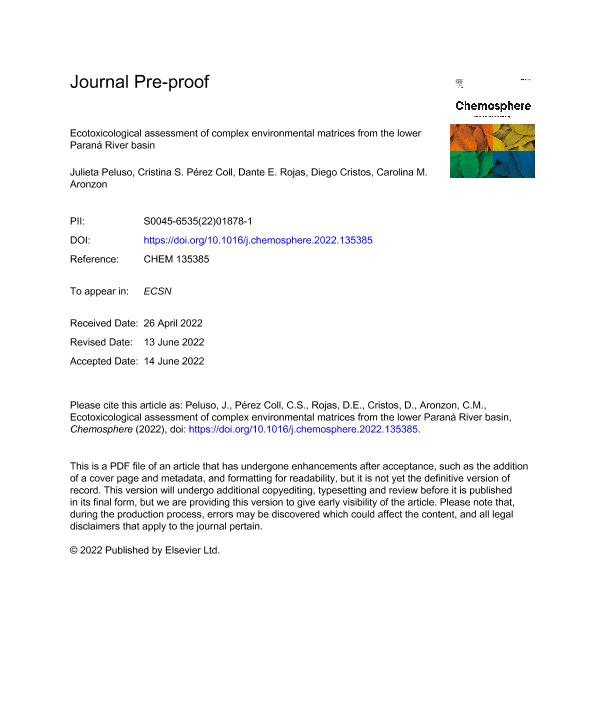Mostrar el registro sencillo del ítem
dc.contributor.author
Peluso, Julieta

dc.contributor.author
Perez Coll, Cristina Silvia

dc.contributor.author
Rojas, Dante Emanuel

dc.contributor.author
Cristos, Diego Sebastián

dc.contributor.author
Aronzon, Carolina Mariel

dc.date.available
2023-07-17T18:23:38Z
dc.date.issued
2022-10
dc.identifier.citation
Peluso, Julieta; Perez Coll, Cristina Silvia; Rojas, Dante Emanuel; Cristos, Diego Sebastián; Aronzon, Carolina Mariel; Ecotoxicological assessment of complex environmental matrices from the lower Paraná River basin; Pergamon-Elsevier Science Ltd; Chemosphere; 305; 135385; 10-2022; 1-36
dc.identifier.issn
0045-6535
dc.identifier.uri
http://hdl.handle.net/11336/204223
dc.description.abstract
Sediments of aquatic ecosystems constitute the fate of most atmospheric and terrestrial pollutants. Since aquatic organisms, such as amphibians, interact with sediments, the presence of pollutants may affect their survival, growth and reproduction. So, the aim of this study was to evaluate, the sediment and water quality of five sites from the lower basin of the Paraná River (Buenos Aires, Argentina) with different anthropic impacts: Morejón stream (S1), de la Cruz stream upstream (S2) and downstream (S3), Arrecifes river (S4), tributary stream of Arrecifes river (S5). Physicochemical parameters were measured in situ (water) and in laboratory (water and sediment samples). Also, a screening of metals and pesticides was performed. Chronic (504 h) lethal toxicity bioassays were performed exposing Rhinella arenarum larvae to sediment and water samples. Oxidative stress (catalase, superoxide dismutase, glutathione S transferase, reduced glutathione and lipid peroxidation) and genotoxicity (micronuclei test) biomarkers were analyzed at acute (96 h) exposure. According to the calculated water quality index, S1 and S3 showed excellent quality, S2 good quality and, S4 and S5 poor quality. Dissolved oxygen was low in all sites (2.26–5.63 mg/L) and S5 had the highest organic matter content. Copper levels exceeded the limit for the protection of aquatic life in S2 and S4; arsenic levels exceeded its limit in S4; and selenium levels exceeded its limit in S4 and S5. Pesticides were mainly detected in water samples. Sediment from S5 showed higher sulfide and organic matter concentrations. At 504 h, no significant mortality was observed in the control group while S5 caused the greatest mortality (80%), followed by S2 (66.67%), S1 (63.33%), S3 (46.67%) and S4 (43.4%). All samples caused oxidative stress and lipid peroxidation, and samples from S4 also caused genotoxicity. The analysis of sediment and water samples was a suitable approach to assess the effects of water bodies on a native amphibian species.
dc.format
application/pdf
dc.language.iso
eng
dc.publisher
Pergamon-Elsevier Science Ltd

dc.rights
info:eu-repo/semantics/openAccess
dc.rights.uri
https://creativecommons.org/licenses/by-nc-nd/2.5/ar/
dc.subject
AMPHIBIANS
dc.subject
ECOTOXICOLOGY
dc.subject
SEDIMENT TOXICITY
dc.subject
TOXICITY BIOASSAYS
dc.subject
WATER QUALITY
dc.subject.classification
Otras Ciencias Biológicas

dc.subject.classification
Ciencias Biológicas

dc.subject.classification
CIENCIAS NATURALES Y EXACTAS

dc.title
Ecotoxicological assessment of complex environmental matrices from the lower Paraná River basin
dc.type
info:eu-repo/semantics/article
dc.type
info:ar-repo/semantics/artículo
dc.type
info:eu-repo/semantics/publishedVersion
dc.date.updated
2023-06-30T12:28:30Z
dc.journal.volume
305
dc.journal.number
135385
dc.journal.pagination
1-36
dc.journal.pais
Países Bajos

dc.journal.ciudad
Amsterdam
dc.description.fil
Fil: Peluso, Julieta. Consejo Nacional de Investigaciones Científicas y Técnicas; Argentina. Universidad Nacional de San Martín. Instituto de Investigación e Ingeniería Ambiental. - Consejo Nacional de Investigaciones Científicas y Técnicas. Oficina de Coordinación Administrativa Parque Centenario. Instituto de Investigación e Ingeniería Ambiental; Argentina
dc.description.fil
Fil: Perez Coll, Cristina Silvia. Consejo Nacional de Investigaciones Científicas y Técnicas; Argentina. Universidad Nacional de San Martín. Instituto de Investigación e Ingeniería Ambiental. - Consejo Nacional de Investigaciones Científicas y Técnicas. Oficina de Coordinación Administrativa Parque Centenario. Instituto de Investigación e Ingeniería Ambiental; Argentina
dc.description.fil
Fil: Rojas, Dante Emanuel. Instituto Nacional de Tecnología Agropecuaria. Centro Regional Buenos Aires; Argentina
dc.description.fil
Fil: Cristos, Diego Sebastián. Instituto Nacional de Tecnología Agropecuaria. Centro Regional Buenos Aires; Argentina
dc.description.fil
Fil: Aronzon, Carolina Mariel. Consejo Nacional de Investigaciones Científicas y Técnicas; Argentina. Universidad Nacional de San Martín. Instituto de Investigación e Ingeniería Ambiental. - Consejo Nacional de Investigaciones Científicas y Técnicas. Oficina de Coordinación Administrativa Parque Centenario. Instituto de Investigación e Ingeniería Ambiental; Argentina
dc.journal.title
Chemosphere

dc.relation.alternativeid
info:eu-repo/semantics/altIdentifier/url/https://www.sciencedirect.com/science/article/pii/S0045653522018781
dc.relation.alternativeid
info:eu-repo/semantics/altIdentifier/doi/http://dx.doi.org/10.1016/j.chemosphere.2022.135385
Archivos asociados
